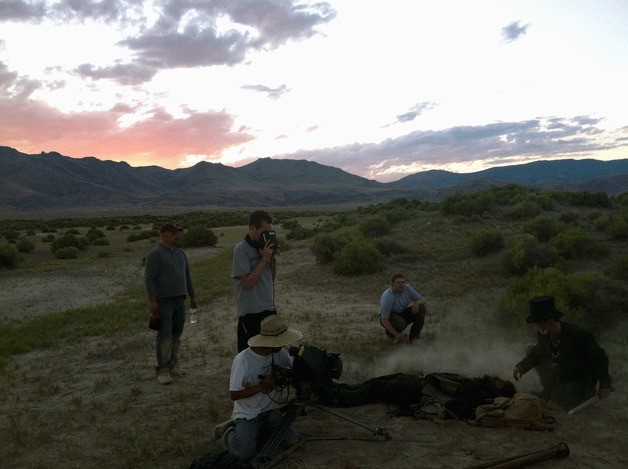To put it mildly, Scott Blake’s break into filmmaking began with disgust.
After reading Cormac McCarthy’s anti-Western novel “Blood Meridian,” the ‘06 BHS alumnus and University of Washington English graduate was driven by the desire to see past the picture Hollywood cinema drew, and he dove nose-deep in historical documents.
His reading material narrated the reality of American settlers and surveyors during the time of the Wild West.
“When you juxtapose that (American history) with how Hollywood Westerns depicted it, you realize how awful the Hollywood Western genre actually is,” Blake explained.
So without any film training, the literature student set out to tell a different story, the truth.
The truth wasn’t John Wayne. It wasn’t the wild adventures of cowboys and Indians that is the basis of childhood games and TV shows. Far from it; it was real-life horror.
“When you start to have story ideas in your own head, it seems to me that movies are the best way to create them,” Blake said.
Blake’s 25-minute short, “The Surveyor,” was premiered at the 2012 Tacoma Film Festival. Since then he has been featured in Seattle’s alternative-weekly newspaper, The Stranger, for “Short Film Fridays,” and in June he was selected as a finalist for its “2013 Film Genius Awards.”
And most recently, Blake was recognized by Filmmaker Magazine as one of 2013’s top “25 New Faces of Independent Film.”
With Blake’s film, viewers are put in the desert-dusted boots of an American surveyor under the shadow of Manifest Destiny. He confronts a wild, lawless land that ultimately haunts him.
During the 1800s, land surveying put foot soldiers on the ground to establish property boundaries in a time when Native Americans and settlers had little to no legal access. The average government surveyor encountered cold-blooded and brutal turmoil as young men and women made their way across the country in search of America’s better way of life.
It was an important job that was at the heart of how some of America’s founders, like George Washington and Daniel Boone, got their start, said Blake.
But it was also known to be the most dangerous job in America at the time.
“You don’t say this a lot about Westerns, but a lot of these people are really young kids,” Blake explained. “It’s a lot of young people going out there trying to find the American Dream, I guess.”
It was a five-year effort for Blake to produce “The Surveyor.”
“The Bainbridge Island Arts & Humanities Council really helped and kind of gave me the confidence to do it,” Blake said.
Blake’s gumption to take on the film project came with a $3,000 grant he received from the island’s Arts & Humanities Council.
He put out a call board for actors and crew techs in the area, and he learned a lot through on-the-job training.
Over the course of the next few years, his screenplay underwent self-edits, production additions and cast members that ultimately amounted to a $15,000-set. There were times when he had to put the project on hold so he could earn the money to pay for it as he went.
“It actually got a lot of attention from Seattle filmmakers, but when they realized it was low budget it was really hard to get top team members,” Blake said. “Fifteen grand is really low budget, believe it or not.”
Low budget or not, Blake’s first introduction into film has come with plenty of applause and anticipation for what he might come up with next.
This fall, he will be starting his first semester at the American Film Institute in California. Along with this film training, he will also be editing a new script he has completed that he hopes will be his first feature-length film.
In stark contrast to the anti-Western, of which he says he has no interest in doing again — “I don’t like Westerns at all,” he said — this next screenplay promises an almost Robert Redford, “Three Days of the Condor” tone to a post-9/11 mystery thriller set in a world of private security firms.



